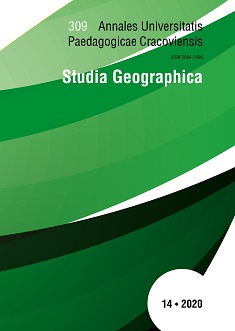Application of the Webquest method in teaching tourist content at primary school
DOI:
https://doi.org/10.24917/20845456.14.5Keywords:
teaching methods; primary school; tourist content; WebQuestAbstract
The development of the Internet started the era of ‘instant information exchange’. The Internet has become essential source of information, also in education. Hence, this contemporary situation requires changes in teaching methods. In particular, the shift of emphasis from teaching to learning, which becomes the only way to keep up with rapidly changing reality. This study proposes to use the WebQuest method in the primary education process. The method underpinned by the constructivist theory enables the development of problem learning skills. Furthermore WebQuest method allows the development of critical and creative thinking and team collaboration. This computer based method is a useful tool in distance learning.
This research aims to present new insights and concepts of education in the field of geography, in particular tourist content and the resulting possibilities to use the WebQuest method in primary school. Finally, the practical principles of creating and advantages of this method for tourism geography is discussed.
References
Caine, G., Caine, R.N., & McClintic, C. (2002). Guiding the Innate Constructivist. Educational Leadership, 60(1), 70–73.
Ciesielka, M. (2016). WebQuest–od informacji do wiedzy technicznej. Zeszyty Naukowe Wydziału Elektrotechniki i Automatyki Politechniki Gdańskiej.
Ciesielka, M., & Sułowski, M. (2013). WebQuest w nauczaniu analizy układów równowagi fazowej. Edukacja–Technika–Informatyka, 2(4), 308–313.
Dodge, B. (2018). Some thoughts about WebQuests. 1995. URL: http://webquest. org/sdsu/about_webquests. html (databasenya 03.03. 2017).
Hassanien, A. (2006). Using Webquest to support learning with technology in higher education. Journal of Hospitality, Leisure, Sport and Tourism Education, 5(1), 41–49.
Lim, S.L., & Hernández, P. (2007). The WebQuest: An illustration of instructional technology implementation in MFT training. Contemporary Family Therapy, 29(3), 163–175.
Łażewska, D. (2012). Zmiany w procesie nauczania-uczenia się – praktyczne rozwiązania i teoretyczne założenia. W: K. Dziurzyński (red.), Dylematy współczesnej edukacji. Jozefów: Wyd. WSGE, 203–219.
Kowalczyk, A. (2000). Geografia turyzmu. Warszawa: Wydawn. Nauk. PWN.
Mayor, F., Bindé, J., Gudmundsson, R., & Le Saux, J. Y. (2001). Przyszłość świata. Fundacja Studiów i Badań Edukacyjnych.
Musiał, E. (2015). Nowoczesne nauczanie cyfrowych tubylców (New ways of teaching Digital Natives). Rocznik Komisji Nauk Pedagogicznych, (LXVIII).
Niksa, T. (2014). Webquest-dobra praktyka w e-Learningu. Zeszyty Naukowe Wydziału Elektrotechniki i Automatyki Politechniki Gdańskiej, 37, 45–48.
Osuch, W. (2014). Przykłady innowacji w liceum – wstępna ocena programu nauczania przyrody w ramach projektu „Kształcenie Pełne Wyobraźni–KPW”. Annales Universitatis Paedagogicae Cracoviensis Studia Geographica, 6, 230–241.
Prensky, M. (2001). On the horizon, 9(5).
Prensky, M. (2003). Digital natives, digital immigrants-A new way to look at ourselves and our kids. Recuperado a partir de http://www. marcprensky. com/writing/Prensky.
Rose, D.H., & Meyer, A. (2002). Teaching every student in the digital age: Universal design for learning. Association for Supervision and Curriculum Development, 1703 N. Beauregard St., Alexandria, VA 22311-1714 Digital natives, digital immigrants
Szkurłat, E., Hibszer, A., Piotrowska, I., & Rachwał, T. (2018). Podstawa programowa geografii źródłem nauczycielskich wyzwań. Prace Komisji Edukacji Geograficznej, 8, 13–31.
Vidoni, K. L., & Maddux, C. D. (2002). WebQuests: Can they be used to improve critical thinking skills in students?. Computers in the Schools, 19(1–2), 101–117.
Yang, C.H., Tzuo, P. W., & Komara, C. (2011). WebQuests and collaborative learning in teacher preparation: a Singapore study. Educational Media International, 48(3), 209–220.
Szkurłat, E., & Piotrowska, I. (2018). GIS w nowych podstawach programowych geografii. Acta Universitatis Lodziensis. Folia Geographica Socio-Oeconomica, 34, 61–76.
Downloads
Published
Issue
Section
License
The submission of a paper to be published is synonymous with an agreement to transfer the copyright free of charge from the author to the publisher. The author also agrees to permit the publisher to publish the paper in printed form, open access online form, digital library form and other digital platforms with which the publisher has or will have a publishing agreement. Furthermore, the author agrees to not limit the number of copies that may be printed or issued by the publisher. In the case of co-authored papers, it is assumed that the corresponding author is authorized to represent the remaining co-authors in this respect. Authors are requested to sign a copyright declaration.

